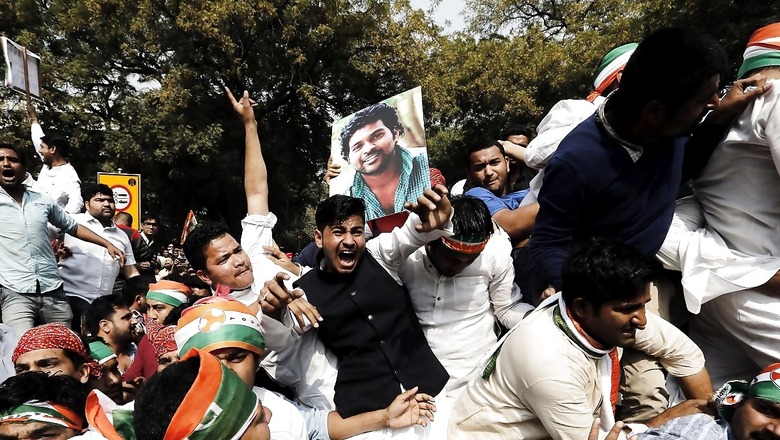
views
Eight years after Hyderabad Central University scholar Rohith Vemula died by suicide, Telangana police have filed a closure report in the case, absolving all accused. Hours later, Telangana’s top cop ordered further probe into the 26-year-old PhD student’s death case. Vemula died on January 17, 2016, leaving behind a note where he said he felt his “birth was his fatal accident”.
In its closure report, police said Vemula wasn’t a Dalit and died by suicide because he feared his “real caste identity” would be revealed. The then Secunderabad MP Bandaru Dattatreya, Member of Legislative Council N Ramachander Rao, Vice Chancellor Appa Rao, and ABVP leaders and Minister for Women and Child Development Smriti Irani were accused in the case.
Later, in an official statement, Telangana Director General of Police (DGP) Ravi Gupta said that as some doubts have been expressed by the mother and others of the deceased Rohit Vemula on the investigation conducted, it has been decided to conduct further investigation into the case.
“A petition will be filed in the Court concerned requesting the Hon’ble Magistrate to permit further investigation into the case,” he added.
Born on January 30, 1989, Vemula hailed from Andhra Pradesh’s Guntur district. He was a PhD student at Hyderabad Central University where he was a part of the Ambedkar Students Association (ASA) on campus.
Timeline of Rohith Vemula’s Death
The university stopped Vemula’s monthly stipend in July 2015, leading to accusations of targeted discrimination due to his activism under the banner of ASA.
However, officials denied the allegation saying the delay was due to “paperwork.”
Later, on 5 August 2015, an inquiry was opened against Rohith and four other ASA members, two days after they allegedly assaulted ABVP leader N Susheel Kumar.
They all denied the charge and the university cleared them in an initial inquiry.
The situation reportedly escalated further after the BJP MP Bandaru Dattatreya characterised the university as being a hotbed of “casteist, extremist, and antinational politics.”
This intervention reportedly resulted in the suspension of all five students in September 2015. On December 17, 2015, the decision was upheld.
Vemula, along with his fellow suspended students, resorted to a hunger protest in protest against the financial strain and institutional ostracization.
In a handwritten letter to the Hyderabad University vice-chancellor on December 18, 2015, Vemula said, “Please serve 10 mg of Sodium Azide to all Dalit students at the time of admission with directions to use when they feel like reading Ambedkar…Supply a nice rope to the rooms of all Dalit students from companion, the great Chief Warden.”
However, on January 17, 2016, Vemula tragically took his own life. His death prompted nationwide protests against discrimination towards Dalits in universities.
What Did The Closure Report Say?
The report, which police submitted in the Telangana High Court on Friday, said Vemula committed suicide in fear of his real caste being revealed as he did not belong to the Scheduled Caste category. It also alleged that the family forged the caste certificates without providing any evidence for the same.
Notably, Rohith’s mother Radhika Vemula has claimed that she belonged to the SC Mala caste while his father Mani Kumar belonged to the Vaddera OBC community. As per Radhika Vemula, Mani Kumar abandoned her and her children after he discovered her Dalit identity.
While the case of 26-year-old PhD student’s death was primarily registered under Section 306 (Abetment to suicide) of the Indian Penal Code (IPC) and relevant sections of the SC/ST Prevention of Atrocities (POA) Act, the closure report focused on Vemula’s caste location.
The report also blames Rohith for “appearing to be involved more in student political issues in the campus than studies”, despite his friends describing him as a “hard-working”, “brilliant” and “kind-hearted” person.
“There is no evidence of any fact or circumstance available on the record which dragged him to commit suicide and no one is responsible for his death,” the report read.
Aabsolving university administration and political leaders against whom the students had filed the case, the report stated that Rohith had “his own problems and was not happy with worldly affairs.”
“If he would have been angry with the decision of the University, certainly either he would have written in specific words or would have indicated in this regard. But he did not do the same. It shows that the circumstances prevailing in the university at the time were not the reason for Rohith’s death,” the report added.
Interestingly, the report on the controversial death case just 10 days before Telangana votes in the Lok Sabha polls on May 13.
The closure report was released around four months after the Congress government came into power in Telangana. After Rohith died in 2016, Congress extended support to the ‘Justice for Vemula campaign’. The party also promised to bring a law named Rohith Vemula Act to “safeguard the right to education and dignity” for the Scheduled Castes (SC), Scheduled Tribes (ST), Other Backward Classes (OBC) and minorities.
So far, the Congress government in Telangana has responded to the closure report
Find Lok Sabha Election 2024 Phase 3 Schedule, Key Candidates And Constituencies At News18 Website.
















Comments
0 comment